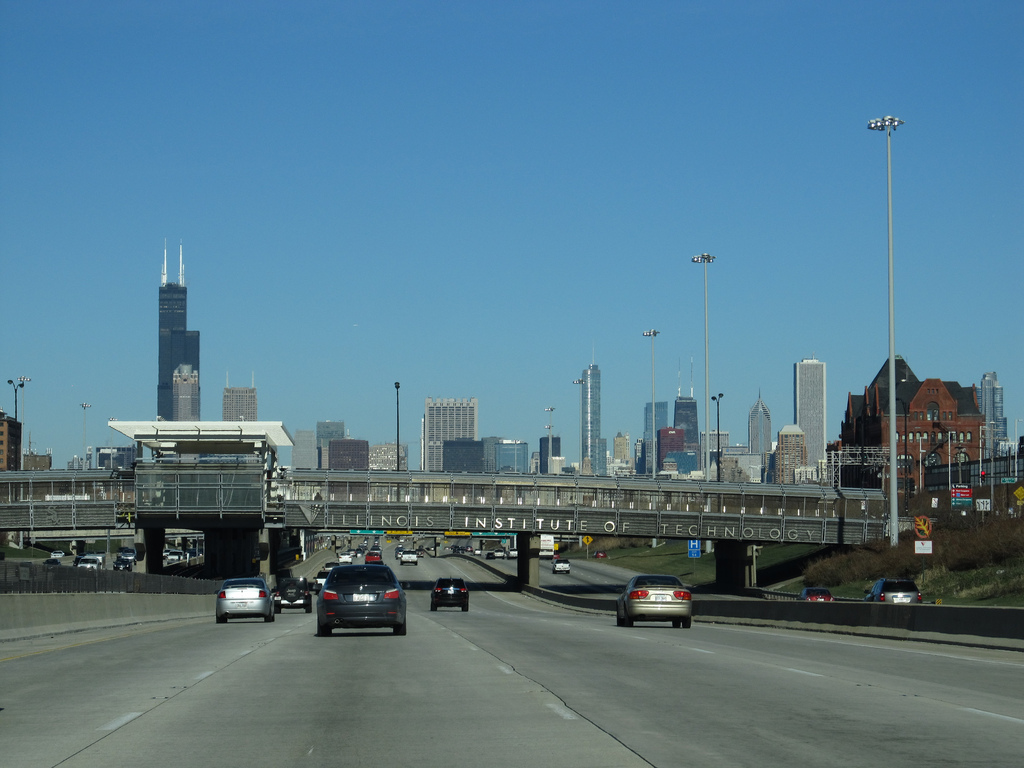- Details
 When dog owner Todd Agosto struggled to find a dog park in the south side of Chicago, rather than traveling to a different neighborhood, he built one instead.
When dog owner Todd Agosto struggled to find a dog park in the south side of Chicago, rather than traveling to a different neighborhood, he built one instead.
Created on a series of abandoned tennis courts in the Jackson Park neighborhood, Jackson Bark has become the third largest dog park in Chicago and the only dog-friendly area in the far south side of the city.
Agosto, who is the proud owner of a pit bull and a German shepherd, first started building the community dog park in 2014. He used his own funds and did most of the work to help create the dog agility and obstacle course.
More than 90 percent of the materials Agosto used for the dog course were salvaged from leftover construction projects in the surrounding neighborhoods. For instance, Jackson Bark’s handmade agility equipment includes recycled tires built into steps that dogs can climb.
The park also boasts two separate play areas, 100 pieces of equipment and a wide variety of toys. Additionally, because it’s equipped with lights, Jackson Bark is one of the only places in Chicago where dogs are welcome after dark.
Although Jackson Bark is not officially recognized by the Chicago Park District, the informal site has become beloved by residents and dog owners all throughout the south side. It is completely run and maintained by Agosto and volunteers from the community.
Jackson Bark recently celebrated its third anniversary on August 26, which also happens to be International Dog Day.
- Details
 CHICAGO – A Chicago food incubator is planning to open a new $30 million facility in the East Garfield Park Neighborhood of Chicago. The Hatchery, an organization that helps local restaurants grow and expand, announced it will open a 67,000 square foot facility in the impoverished West Side community.
CHICAGO – A Chicago food incubator is planning to open a new $30 million facility in the East Garfield Park Neighborhood of Chicago. The Hatchery, an organization that helps local restaurants grow and expand, announced it will open a 67,000 square foot facility in the impoverished West Side community.
The Hatchery is a joint venture between Accion Chicago, the Industrial Council of Nearwest Chicago and the IFF, a Community Development Financial Institution that helps entrepreneurs with financing. The purpose of the Hatchery is to put all three areas needed for business success in one place: access to production space, financing and resources.
The Hatchery estimates the new facility will create up to 150 jobs the first year it opens, 2018. They also estimate that by year 5, almost 900 jobs will have been created locally.
The new facility will have everything local entrepreneurs need to start their business and live the American Dream. The facility will include 56 private production spaces, storage, a shared kitchen, event space, meeting rooms, training for entrepreneurs and Accion Chicago’s new headquarters.
Construction on the facility is planned to begin this fall and should be complete by the fall of 2018. The new facility will be located near the Kedzie Green Line station at Lake Street and Kedzie Avenue.
- Details
 A recent report from the National Safety Council ranks Illinois as the top state in the nation for road safety. The State of Safety report focuses on eight categories, including: distracted driving impaired driving, seat belt usage, child passengers, older drivers, speeding, teen drivers and vulnerable road users.
A recent report from the National Safety Council ranks Illinois as the top state in the nation for road safety. The State of Safety report focuses on eight categories, including: distracted driving impaired driving, seat belt usage, child passengers, older drivers, speeding, teen drivers and vulnerable road users.
Illinois’ top grade on road safety would not have been possible without the work and commitment of Senate President John Cullerton, who has championed traffic safety legislation over the past 30 years.
The Senate President began working to improve road safety early in his career when he sponsored the Child Passenger Protection Act in 1983. This law required children under age 4 to use child safety seats in cars. This legislation was later updated in 2003 to extend protections to children under the age of 8 with the addition of a booster seat requirement. To learn more about child passenger safety laws, click here.
Soon after that, the Senate President sponsored legislation to require front-seat passengers in cars to wear seat belts. At the time, just over 15 percent of passengers used seat belts. Now, that number has climbed to 94 percent. The Senate President expanded this legislation in 2011, when he sponsored a bill to require passengers in the back seat of vehicles to wear seat belts as well.
To combat the rising number of teen deaths and car accidents, in 2007, the Senate President helped implement graduated licenses for teens. Under this legislation, teens progress through a series of tiered driving restrictions as they gain more experience.
While serving as the Senate President, legislation to curb distracted driving was implemented. In the time it takes to look at a text message, a car traveling at 55 miles per hour will cover the length of a football field. Since 2014, driving while using a phone is a ticketable offense. Drivers are still able to use hands-free features on their phones and one-touch dialing.
These important pieces of legislation have saved countless lives and contributed to Illinois’ recognition for having the safest roads in the U.S.

- Details
Chicago Mayor Rahm Emanuel announced recently that the city’s industrial property vacancy rate has hit its lowest point in 16 years.
Chicago’s industrial property vacancy rate dropping to just 6.6 percent suggests that the local advanced industrial economy is back on the upswing after decades of job loss due to offshoring and automation. The rate of occupancy in industrial buildings is just one indicator of Chicago’s economic health. Mayor Emanuel announced a few other favorable statistics this week, framing Chicago as a desirable location for corporate headquarters and tech-savvy businesses.
Thanks to a strong trend of corporate relocations to Chicago—2017 marked Chicago’s fourth straight year as Site Selection Magazine’s top metro for corporate investment—the downtown commercial real estate market continues to boom. Average downtown office value grew by 20% over the past year, which is the second-largest increase in the world.
Chicago also continues to attract and retain technology talent. “Silicon Prairie,” as it is sometimes called, is a growing site for innovation, rivaling tech incubators in New York and the Bay Area. I Like Illinois has already reported that investments in Chicago’s tech scene pay out at higher rates than investments in any other technology hub in the United States. To this point, Emanuel also mentioned that Chicago was named the sixth best city in the world for technological innovators in a survey of industry insiders.
These numbers tell a powerful story about Chicago. With desirable real estate and a strong technology sector, the city is developing an economy that will support a large and diverse workforce for many years to come.

- Details
As summer begins, there is no better time to enjoy Illinois’ parks and the many activities that are available in warmer months. With its well-maintained infrastructure, shady trees and miles of trails, Illini State Park is a classic Illinois summer destination. According to the Illinois Department of Natural Resources’ website, “Illini State Park is the type of park you think of when you think of big picnics and family gatherings.”
Located along the Illinois River in Marseilles, Illini State Park is an ideal Northwestern Illinois location for enjoying the spring and summer weather. In the 1930s, the Civilian Conservation Corps renovated portions of the nearby Marstawa Country Club, adding them to the park. This means that there is significant, solid infrastructure in place for outdoor activities including camping, picnics and youth events.
Other recreational spaces include a baseball diamond and numerous horseshoe pits. During the warmer months, a concession stand serving food, drinks and ice cream opens in the park.
Illini State Park is home to hickory, ash, walnut, elm, cottonwood, oak and maple trees. During spring and summer, visitors can spot blooming wildflowers, white-tailed deer, squirrels, opossums, beavers, raccoon, groundhogs, waterfowl and songbirds.
The river has an ample supply of crappie, bass, bluegill, catfish, carp and many other species. A boat ramp is available, but boaters should be aware that the park is close to the Marseilles Lock and Dam and that barge traffic can be heavy.
There is something for everyone at Illini State Park. The opportunities for good times grow as summer comes to Illinois. Plan your trip to Illini State Park today!



